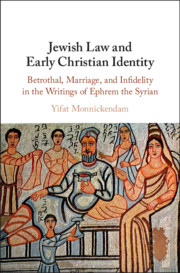 Jewish Law and Early Christian Identity
Jewish Law and Early Christian Identity Published online by Cambridge University Press: 12 December 2019
No doubt, the author of this text, Ephrem of Edessa, was a faithful post-Nicene Christian. Ephrem (306–373 CE) was one of the most renowned Syriac Christian writers and is one of the earliest known to us by name. Living in the eastern provinces of the Roman Empire, Ephrem followed the New Testament and the teachings of the Western Church, and accepted Paul’s abolition of the commandments. Like his contemporaries from the Western Roman Empire, he claimed that the commandments were given to the Jews because of the “hardness of their hearts.” But, he argued, after the Christians had been chosen as the People of God, there was no need for these commandments.
To save this book to your Kindle, first ensure no-reply@cambridge.org is added to your Approved Personal Document E-mail List under your Personal Document Settings on the Manage Your Content and Devices page of your Amazon account. Then enter the ‘name’ part of your Kindle email address below. Find out more about saving to your Kindle.
Note you can select to save to either the @free.kindle.com or @kindle.com variations. ‘@free.kindle.com’ emails are free but can only be saved to your device when it is connected to wi-fi. ‘@kindle.com’ emails can be delivered even when you are not connected to wi-fi, but note that service fees apply.
Find out more about the Kindle Personal Document Service.
To save content items to your account, please confirm that you agree to abide by our usage policies. If this is the first time you use this feature, you will be asked to authorise Cambridge Core to connect with your account. Find out more about saving content to Dropbox.
To save content items to your account, please confirm that you agree to abide by our usage policies. If this is the first time you use this feature, you will be asked to authorise Cambridge Core to connect with your account. Find out more about saving content to Google Drive.